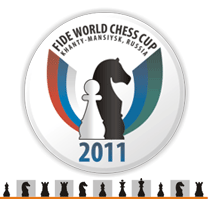| 27/08/2011, 11:51 |
 The world's strongest players will come to Khanty-Mansiysk to participate in the World Cup between August 27 and September 20.
The world's strongest players will come to Khanty-Mansiysk to participate in the World Cup between August 27 and September 20.
This marathon knock-out competition is held in the capital of Ugra for the fourth time since 2005. All the events were carried out at a very high level, and thanks to them Ugra is now considered as one of the best places in the world when it comes to organizing large-scale tournaments.
The history of the World Cups is rich and surely complicated. In 1997, 1999, 2000, 2001 and 2004 these knock-out tournaments had the championship status. This spectacular but unusual format for chess championships produced five champions: Anatoly Karpov (Russia), Alexander Khalifman (Russia), Vishy Anand (India), Ruslan Ponomariov (Ukraine) and Rustam Kasimdzhamov (Uzbekistan). These events helped many chess professionals to stay in business during turbulent times due to always juicy prize pools and discovered new stars. However, public opinion as well as many leading grandmasters wanted to see a more traditional format of the championship. In 2005 and 2007 FIDE decided to switch to a round-robin double-round tournament, and later on came back to the traditional title matches. However, the exciting knock-out event reappeared under another name — the World Cup.
The first World Cup (by the way, do not mix it with 1st and 2nd FIDE World Cups that were held in 2000 and 2002 in China and India respectively, had the same winner — Vishy Anand, and were not a part of the World championship cycle — translator's note) took place between November 26 and December 17 2005. The Ukrainian Vassily Ivanchuk was the highest rated player, followed by Etienne Bacrot (France), Levon Aronian (Armenia), Alexander Grischuk (Russia), and Boris Gelfand (Israel). Ponomariov and Aronian advanced to the finals, won by the Armenian grandmaster, who became the first World Cup champion. Ten top finishers received the right to participate in the candidates matches.
Two years ago the second edition of the World Cup was again held in the capital of Ugra. The highest rated participants were Ivanchuk, Bacrot, Grischuk, Aronian, Peter Svidler (Russia), Magnus Carlsen (Norway), Teimour Radjabov (Azerbaijan), Alexei Shirov (Spain), and Gata Kamsky (USA). The latter two players met in the finals, won by the American come back star, who earned a place in the semi-final of the World championship.
The rating favorites of the World Cup 2009 included Gelfand, Svidler, Radjabov, Ivanchuk, Ponomariov, Grischuk, Vugar Gashimov (Azerbaijan), Alexander Morozevich (Russia), Dmitry Jakovenko (Russia), and Wang Yue (China). The final match was played between the experienced Boris Gelfand and the Ex-World Champion and the World Cup 2005 runner-up Ruslan Ponomariov. Gelfand defeated his opponent and advanced to the candidates matches 2011. Having won three matches in Kazan, the Israeli veteran earned his right to challenge the World Champion.
The 4th World Cup will take place in the recently constructed Ugra Chess Academy, which hosted the FIDE Congress and General Assembly during the 39th Chess Olympiad last year. According to the regulations 128 players will start the competition, although the opponents of Vladimir Akopian (ARM) and Wang Hao (CHN) will be automatically qualified for the 2nd round. Unfortunately, both sportsmen have had health problems right before the commencement of the tournament. That is why they will not be able to come to Khanty-Mansiysk.
The rating favorites of the event are Sergey Karjakin (Russia), Vassily Ivanchuk (Ukraine), Shakhriyar Mamedyarov (Azerbaijan), Ruslan Ponomariov (Ukraine), Vugar Gashimov (Azerbaijan), Alexander Grischuk (Russia), Teimour Radjabov (Azerbaijan), Gata Kamsky (USA), Peter Svidler (Russia), Dmitry Jakovenko (Russia), and Nikita Vitiugov (Russia). Among the participants are two ladies — Judit Polgar (Hungary), the strongest female player in the history of chess, and Hou Yifan (China), the reigning World Champion. This will be, as usual, one of the most spectacular competitions of the year.
Maria Fominykh,
International master
| Tweet |





















